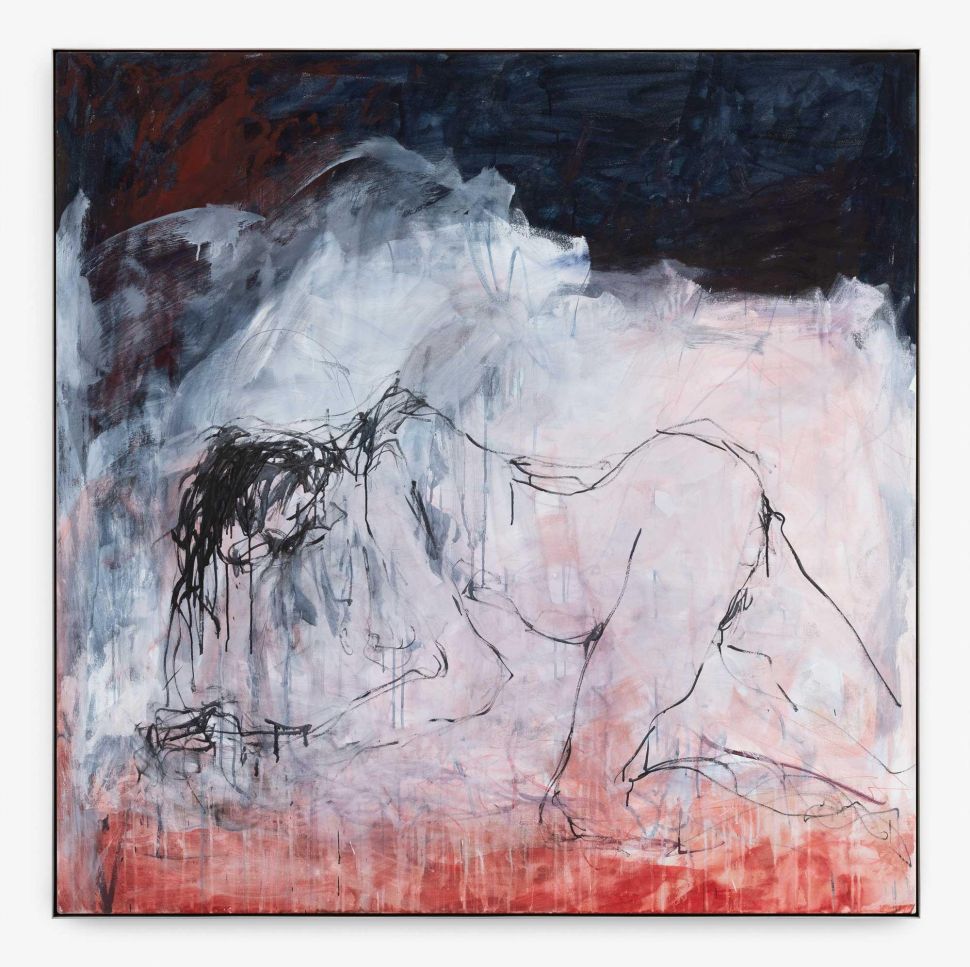Tracey Emin portrays a nude woman on her hands and knees, outlined in black over a pink and white background, with red paint suggesting a pool beneath her.” width=”970″ height=”967″ data-caption=’Tracey Emin, <em>You Kept it Coming</em>, 2019; acrylic on canvas, private collection. <span class=”lazyload media-credit”>© HV-Studio, courtesy of the artist and Xavier Hufkens</span>’>
Tracey Emin’s paintings have an uncanny ability to get inside you and stir up all kinds of conflicting emotions, and her recent exhibition, “I Loved You Until The Morning,” at the Yale Center for British Art was an emotional broil. I alternated between rage and sadness, revulsion and awe. I asked the museum guard what he thought. He said, “It’s more painful than there is love. But it is because of love that there is pain.” A young woman stood with her face a foot away from the figure’s open legs with their gush of crimson for a good five minutes, unmoving. An older woman told me that it made her relive her forty years of menstruation: the cramps and emotional swings and her two abortions.
Not for the faint of heart, Emin’s work demands attention. The paintings here are large—one is six feet by seven feet, another nearly seven by nine—mostly done in red, black, blue and white acrylic paint. The naked female figures are splayed across the canvas, exposed and vulnerable. And So It Felt Like This (2018) is a spare line of a seated nude woman, slumped back, legs wide, red paint pouring out from between her legs. The face is not defined, nor are her hands. For all its painted simplicity, it packs a visceral punch. Has she just been raped and left nearly dead? Is she in the throes of a painful period? Has she just given birth? Lost the baby? All of these possibilities explode out of the painting, relentless and hurting. Art critic Jerry Saltz once called Emin, “one of the greatest artists alive in the world today.”
Born in 1963 in the seaside town of Margate, England, Emin grew up in poverty and was three times homeless. As a child, she was sexually abused and at 13 raped. At 27, she had a painful, botched abortion with a doctor who dismissed her distress. In her 22-minute film How It Feels (1996), she talks about the abortion and how making art could no longer “be about a fuckin’ picture. It couldn’t be about something visual…an old-fashioned idea that made no sense for the times we are living in…It had to be about where it was really coming from.”
SEE ALSO: Paola Mura Reflects On the Material Universality of Artist Maria Lai’s Work
The installation work My Bed (1998) was her own slept-in bed, with dirty sheets and underwear, empty alcohol bottles, pills, cigarette butts and used condoms. It was shortlisted for the Turner Prize and installed at the Tate Museum, London, drawing huge crowds. My Bed pitched her onto the art world map. She exhibited at the Venice Biennale in 2006, the second woman in the history of the British Pavilion to be offered a solo show.
Emin has had three exhibitions with her favorite artists: Egon Schiele, Edvard Munch and J. M. W. Turner. Her nine-foot-high, eighteen-ton bronze sculpture The Mother towers at the Munch Museum in Oslo. The monumental piece was created as a tribute to her mother, to all mothers and to the Earth.
She was elected to the Royal Academy in 2007 and became its Eranda Professor of Drawing in 2011. In 2020, Emin bought a 1909 bathhouse in Margate, Kent, the seaside town where she was born and grew up. She renovated it and founded the Tracey Emin Artist Residency (TEAR), a studio-based, two-year art school where all the classes and lectures are free. TKE Studios offers affordable studio space for twelve professional artists with a strong practice. “If my art can do something for the future, then I’ve done something for the world.” In 2024, she was appointed Dame Commander of the Order of the British Empire for her contributions to the visual arts.
“I Loved You Until The Morning” features nineteen of her large-scale acrylic on canvas works, along with three bronze sculptures, thirteen drawings and a six-by-six-foot yellow neon sign greeting you at the entrance with the title of the show. One could visit the exhibition and study only the titles of the work, which read like Emin’s memoir (and like those of any number of women’s lives, poignant and spot-on). I said No, And It was Love, I Followed you to the end, I wanted to be clean, Pelvis High, Sometimes There is No Reason, You kept it coming, I never Asked to Fall in Love – You made me Feel like This. The exhibit is stunningly curated by Martina Droth, and the thorough and beautifully illustrated catalogue includes her excellent essay.
The paintings are layered with thin paint, not, as Emin said, “great big thick macho globules of paint.” She lets the blood red drip, the inky black obscure, the whites blend, thin sketchy blue lines illustrate. Describing the paintings feels like a disservice to the art. They are swimming in fury and compassion. They are violent, aggressive, in-your-face confrontational, and filled with pain, sorrow and loss. I asked one man viewing the exhibition what he thought about Emin’s paintings, and he said, “All the mistakes I made with women are here.”
“Tracey Emin: I Loved You Until The Morning” is at the Yale Center for British Art in New Haven through August 10, 2025.

